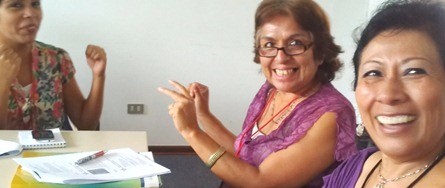Teachers’ professional knowledge is most important part of any successful school. The teachers need this knowledge base to act as autonomous experts who are able to plan, implement and assess teaching and learning and, moreover, collaborate with other teachers, parents, principal and other stakeholders. However, it is not straightforward to learn this knowledge.
Here are some characteristics of a Professional Development Program (PDP) which could support teachers to construct and continuously increase their professional knowledge shortly introduced.
Teachers PDPs have been researched a long time. Characteristics of a PDP which supports the adoption of professional knowledge could be outlined as follows (Van Driel, Beijaard & Verloop, 2001; Lavonen, Juuti, Aksela, & Meisalo, 2006):
- careful selection of the course content, i.e. domains of teacher’s professional knowledge,
- grouping of teachers in heterogeneous and collaborative groups during the program in order to support teachers learning,
- a series of face-to-face training sessions and distance supported e-learning at school level,
- co-planning, implementing and assessment of teaching modules by participating teachers,
- reflection on the implementation of the modules in collaborative groups,
- versatile context including the use of technology and integration of it to the modules,
- cumulative development of teachers’ professionalism starting where teachers are,
- follow-up meetings for sharing the results of the efforts.
Reflection
One essential characteristics of a successful PDP are reflective activities. Reflection refers to a process in which an experience is recalled, considered, and evaluated, usually in relation to a broader purpose. Rodgers (2002) describes reflection as a meaning-making process, compares it to research, and lists phases of reflection: setting of aims or recognizing the problem(s) or the question(s), making observations of one’s own behaviour in practice, description of observations and experiences, and analysis of observations and experiences. Hiebert et al. (2002) state that professional knowledge has to be accurate, verifiable, and continually improved. Therefore, collaborative reflective activities are important to integrate to a PDP.
Action research belongs to the “Teacher as a researcher movement” and is different from research conducted by the researchers. The aim of “real” research is to generalize while action research is research done by the teachers for themselves and aims to gain knowledge that can be applied to teachers own teaching. The aim of action research, done by the teachers, is to support teachers to understand their own teaching and students’ behaviour or learning. The action research aims to improve learning and engagement of students.
There are many benefits in conducting action research but it does require time and energy. Action research can, for example,:
- lead to positive changes in a classroom or in a school,
- strengthen professional development and improvement for classroom practices,
- provide opportunities for collaboration with teachers and with teachers and researchers or teacher educators,
- be a part of further studies,
- create rich opportunities for reflecting on practice and support for learning from practice or conceptualisation of practice.
